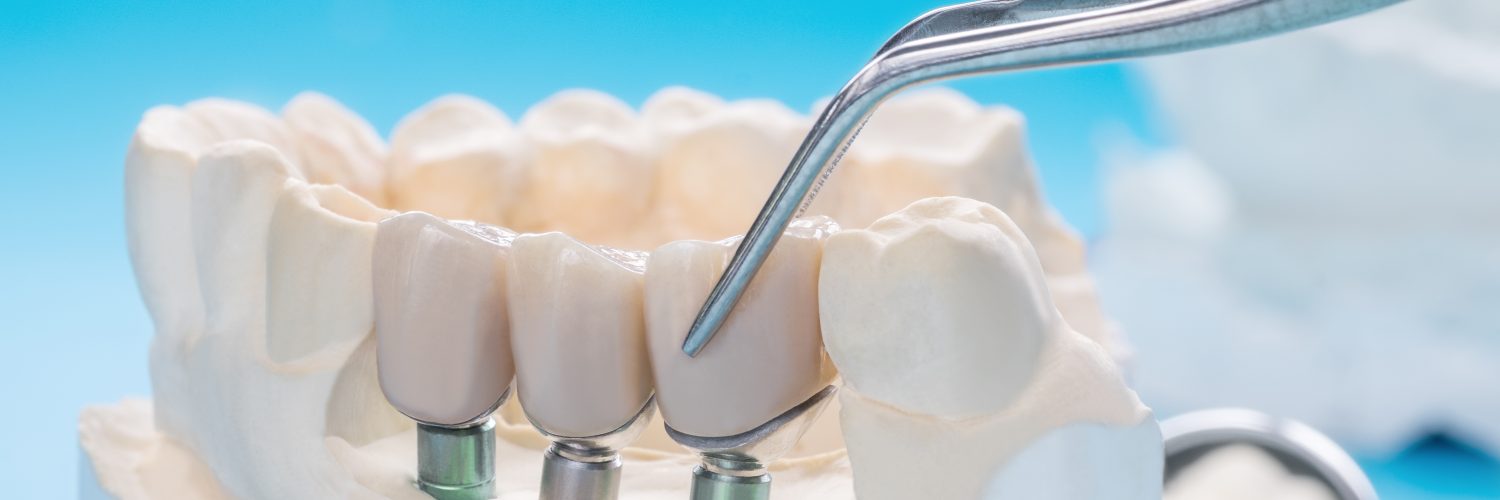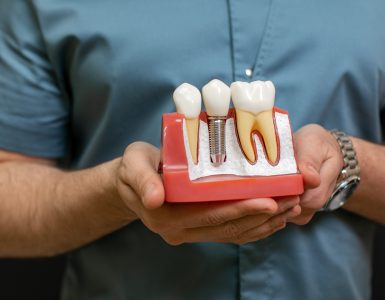For some losing a tooth may not seem a big deal and you’ll just get used to being without it. For others the effect on your smile might make you incredibly self-conscious. After a tooth loss you may wonder whether you really need or want to replace it. There are other very important factors, apart from your smile, that you need to take into consideration when deciding to replace a missing tooth.
What causes tooth loss?
Over time, and particularly as we age, most of us will at some stage suffer the loss of a tooth. These are the most common reasons:
- The bacteria in plaque on your teeth turns the sugars in food and drink into acid that can wear down the enamel in your teeth causing decay. If this decay is not treated the cavity can destroy the pulp at the centre of your tooth, resulting in the need for a root canal, or possibly the removal of your tooth.
- Gum Disease. A severe gum infection damages the tissues that hold your teeth in place and can lead to deterioration in the jawbone underneath the gums. This lack of support can lead to tooth loss and is the main cause of tooth loss among adults.
- Disease or Illness. There are some conditions, such as diabetes, cancer, osteoporosis, rheumatoid arthritis and others, that can affect your teeth and gums causing gum disease and affecting the bone in your jaw.
- Physical Injury or Trauma. Accidents can happen, particularly to younger people who play a lot of sport, whether during rugby or other high contact sport, or falling off a skateboard at the park. You could have a fall, or be in a car accident. However, other causes of damage or tooth loss can be avoided. It’s not a good idea to use your teeth to open lids, remove caps, chew ice, crack nuts or loosen knots and other similar things that could cause harm to your teeth.
Is it important to replace a missing tooth?
A missing tooth is more important than just how it looks, it can have an impact on your dental health. Your teeth pay an important role not just in eating, but also in supporting your face and jaw, so missing teeth can cause problems inside and outside of your mouth impacting not only your appearance, but also your oral health and general health.
- General Health. Missing teeth can affect your ability to chew your food properly and can cause pain or prevent you from eating some foods. Avoiding some foods may lead you to have some nutritional deficiencies in your diet which could impact your overall health and wellbeing.
- Mental Health. Having a gap in teeth can often make you feel self-conscious causing you to lose confidence, cover your mouth and avoid smiling. It may also affect how you sound when you talk by interfering with your speech patterns.
- Shifting Teeth. Your teeth support each other, so when a tooth is missing the remaining teeth may move to fill the gap causing crooked or misaligned teeth creating small areas in your mouth that are hard to brush and floss. This could cause problems due to a build-up of plaque and tartar and increases your risk of gum disease.
- Bone Loss. The tooth roots support the jaw and provide stimulation to the jawbone. When a tooth root is missing the bone in the jaw starts to deteriorate in height and width due to the lack of stimulation.
- Changing Face. The resultant bone loss over time can affect the associated muscles causing them to droop. This can affect the shape of your face, cause wrinkles around your mouth and your face to sag making you look older and less attractive. The more teeth that are missing, the greater the change in your appearance.
What tooth replacement options are there?
It is important to replace a missing tooth as soon as you can in order avoid problems with your teeth and jaw. There are several options available.
Dental Implants
Dental implants are a very popular treatment to replace a missing tooth and involves oral surgery. The gum is opened and a small titanium root is surgically implanted in your jaw. As it heals it fuses with the jawbone and an abutment is added with a prosthetic tooth attached. The new root provides stimulation to the jawbone keeping it healthy and encouraging bone growth. The replacement tooth is tailored to look as close as possible to your natural teeth. It is not an instant fix, as the procedure needs to be completed in stages. It can take approximately six months for the new implant to heal and fuse to the bone before the new tooth is fitted. Although it can be an expensive procedure, it provides you with a natural look that feels like a real tooth and can be maintained using your normal cleaning procedure of brushing and flossing. This is a long-lasting alternative and if well cared for should last a lifetime.
Dental Bridges
Another option to replace missing teeth, a dental bridge can replace a single tooth or multiple teeth in a row by bridging the gap. They are usually made of porcelain or a mixture of porcelain and metal and are anchored to the teeth on either side. In some instances, it is possible to combine a bridge with an implant. They provide a natural looking appearance and are highly functional. Use your usual oral hygiene practices of brushing and flossing to maintain them. Provided they are well cared for a dental bridge can last about 10 to 15 years or longer.
Dentures
Dentures are an entire row of teeth that are removable and are recommended for people who have an entire set of teeth missing, although they can be used to replace several teeth. This is a much cheaper alternative and are suitable for people who have unhealthy or weak jaws. There can be problems with them slipping out of place when eating or talking, but that can be remedied with the use of denture adhesive. Due to chewing difficulties, you may need to avoid certain foods. They need to be removed and cleaned every day and should last for 7 to 10 years.
Your dentist will be able to go through the options with you and advise you on the best solution for your particular situation.




